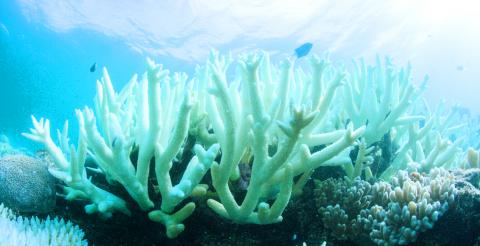Australia’s Great Barrier Reef is experiencing an unprecedented second straight year of mass coral bleaching, scientists said yesterday, warning many species would struggle to fully recover.
The 2,300km reef last year suffered its most severe bleaching on record due to warming sea temperatures in March and April.
Bleaching is once again occurring, the government’s Great Barrier Reef Marine Park Authority said after an aerial survey off Australia’s eastern coast on Thursday.

Photo: EPA
“Regrettably, the temperatures have been high on the Great Barrier Reef this summer as well, and unfortunately [we] are here to confirm ... a mass coral bleaching event for the second consecutive year,” agency reef recovery director David Wachenfeld said in a video on Facebook. “And importantly, this is the first time we’ve ever seen the Great Barrier Reef bleached two years in sequence. We’ve seen heat stress build since December.”
The agency said more bleaching was being observed in the central part of the reef, which last year escaped widespread severe bleaching.
Last year’s bleaching was more severe in the northern areas of the biodiverse site.
The back-to-back occurrence of widespread bleaching also meant there was insufficient time for corals to fully recover, the Australian Institute of Marine Science’s Neal Cantin said.
“We are seeing a decrease in the stress tolerance of these corals,” Cantin added in a statement. “This is the first time the Great Barrier Reef has not had a few years between bleaching events to recover.”
“Many coral species appear to be more susceptible to bleaching after more than 12 months of sustained above-average ocean temperatures,” he added.
Bleaching occurs when abnormal environmental conditions, such as warmer sea temperatures, cause corals to expel tiny photosynthetic algae, draining them of their color.
Corals can recover if the water temperature drops and the algae are able to recolonize them.
However, researchers in January said coral reefs that survive rapid bleaching fueled by global warming would remain deeply damaged with little prospect of full recovery.
The Great Barrier Reef escaped with minor damage after two other bleaching events in 1998 and 2002.
Conservation group WWF-Australia yesterday said that the latest bleaching increased the urgency of tackling climate change in Australia, one of the world’s worst per capita greenhouse gas polluters.
“I did not anticipate back-to-back bleaching this decade,” WWF-Australia oceans division head Richard Leck said. “Scientists warned that without sufficient emissions reductions we could expect annual mass bleaching of the Great Barrier Reef by 2050. Consecutive bleaching events have arrived 30 years early.”

Four people jailed in the landmark Hong Kong national security trial of "47 democrats" accused of conspiracy to commit subversion were freed today after more than four years behind bars, the second group to be released in a month. Among those freed was long-time political and LGBTQ activist Jimmy Sham (岑子杰), who also led one of Hong Kong’s largest pro-democracy groups, the Civil Human Rights Front, which disbanded in 2021. "Let me spend some time with my family," Sham said after arriving at his home in the Kowloon district of Jordan. "I don’t know how to plan ahead because, to me, it feels

The collapse of the Swiss Birch glacier serves as a chilling warning of the escalating dangers faced by communities worldwide living under the shadow of fragile ice, particularly in Asia, experts said. Footage of the collapse on Wednesday showed a huge cloud of ice and rubble hurtling down the mountainside into the hamlet of Blatten. Swiss Development Cooperation disaster risk reduction adviser Ali Neumann said that while the role of climate change in the case of Blatten “still needs to be investigated,” the wider impacts were clear on the cryosphere — the part of the world covered by frozen water. “Climate change and

Poland is set to hold a presidential runoff election today between two candidates offering starkly different visions for the country’s future. The winner would succeed Polish President Andrzej Duda, a conservative who is finishing his second and final term. The outcome would determine whether Poland embraces a nationalist populist trajectory or pivots more fully toward liberal, pro-European policies. An exit poll by Ipsos would be released when polls close today at 9pm local time, with a margin of error of plus or minus 2 percentage points. Final results are expected tomorrow. Whoever wins can be expected to either help or hinder the

DENIAL: Musk said that the ‘New York Times was lying their ass off,’ after it reported he used so much drugs that he developed bladder problems Elon Musk on Saturday denied a report that he used ketamine and other drugs extensively last year on the US presidential campaign trail. The New York Times on Friday reported that the billionaire adviser to US President Donald Trump used so much ketamine, a powerful anesthetic, that he developed bladder problems. The newspaper said the world’s richest person also took ecstasy and mushrooms, and traveled with a pill box last year, adding that it was not known whether Musk also took drugs while heading the so-called US Department of Government Efficiency (DOGE) after Trump took power in January. In a